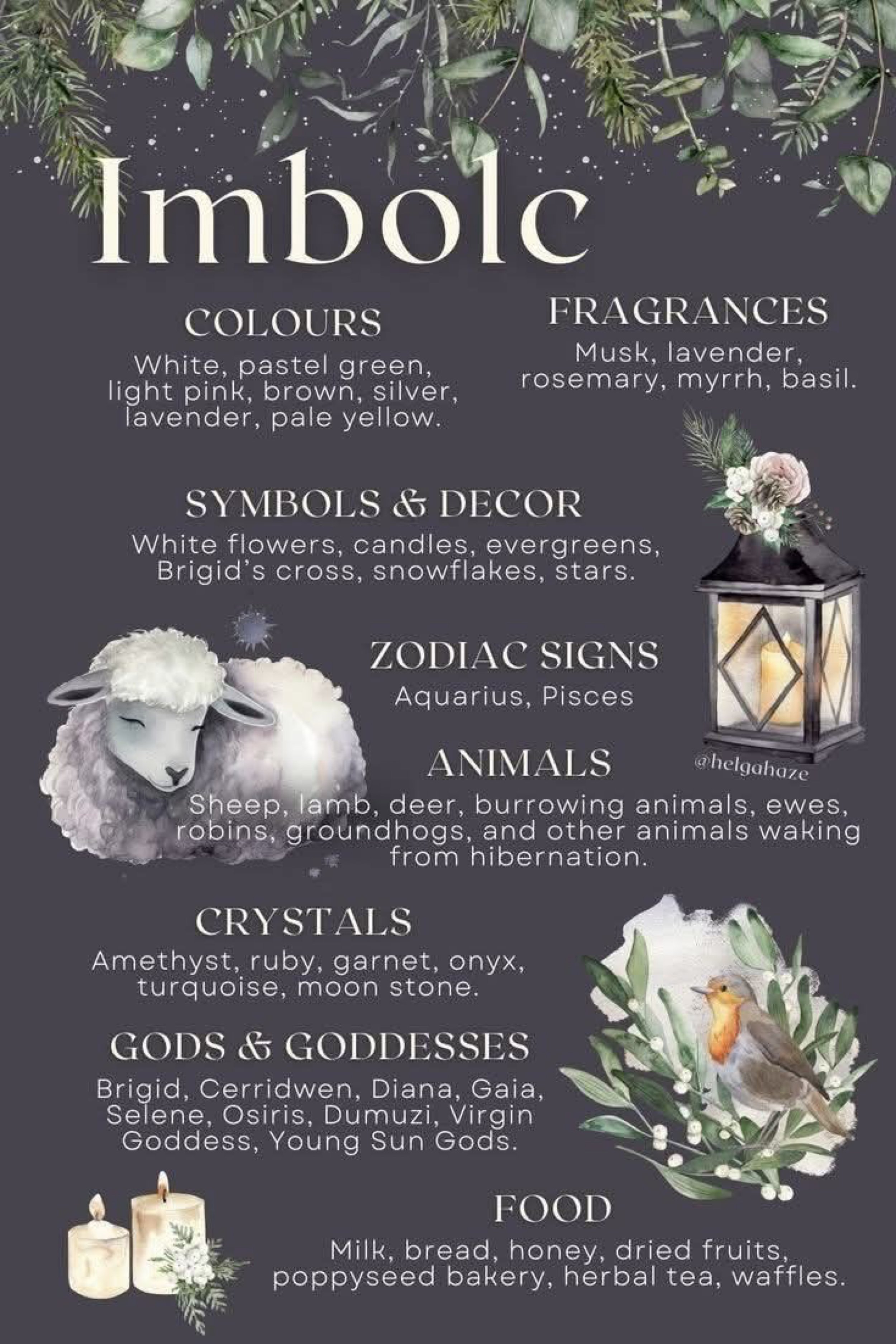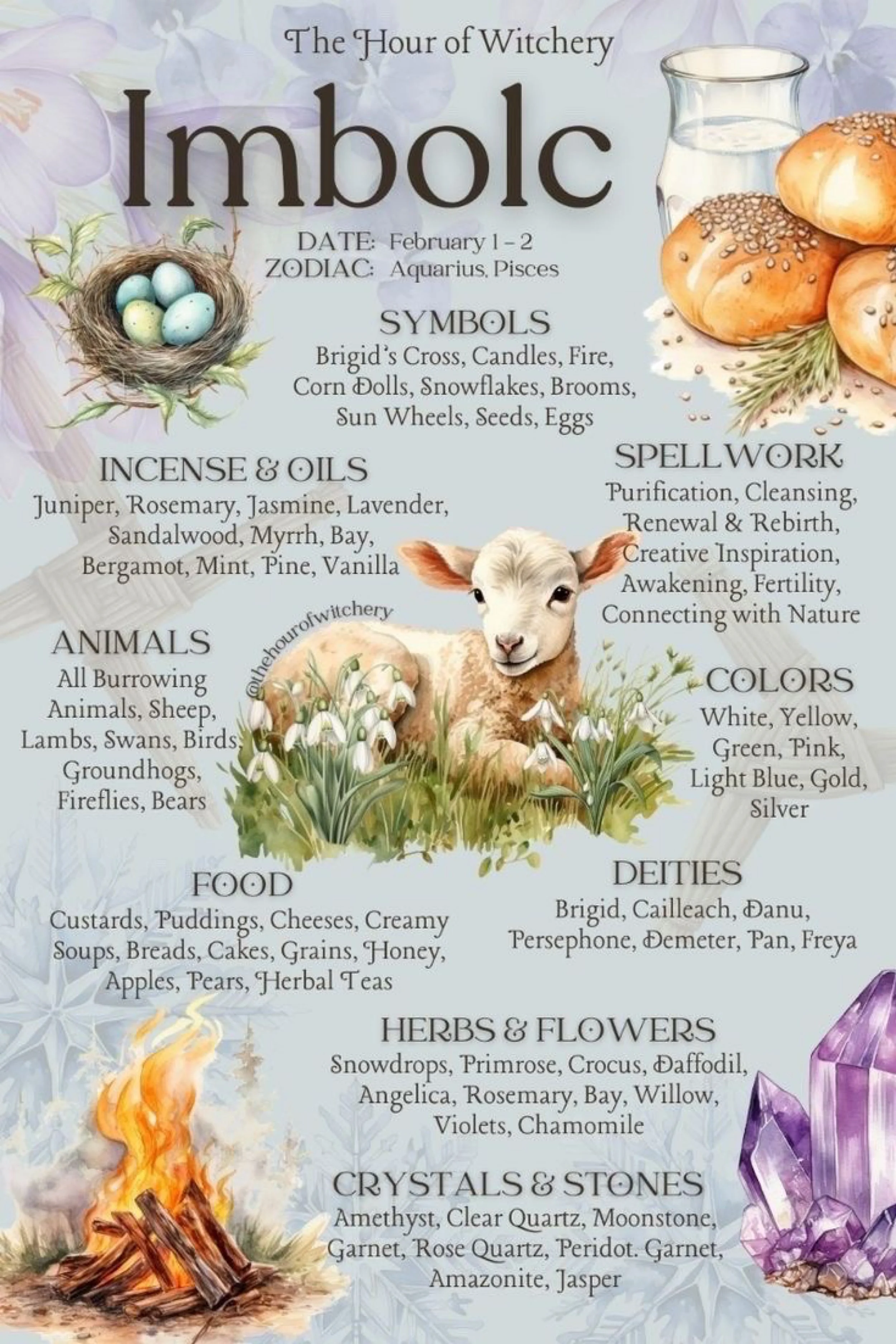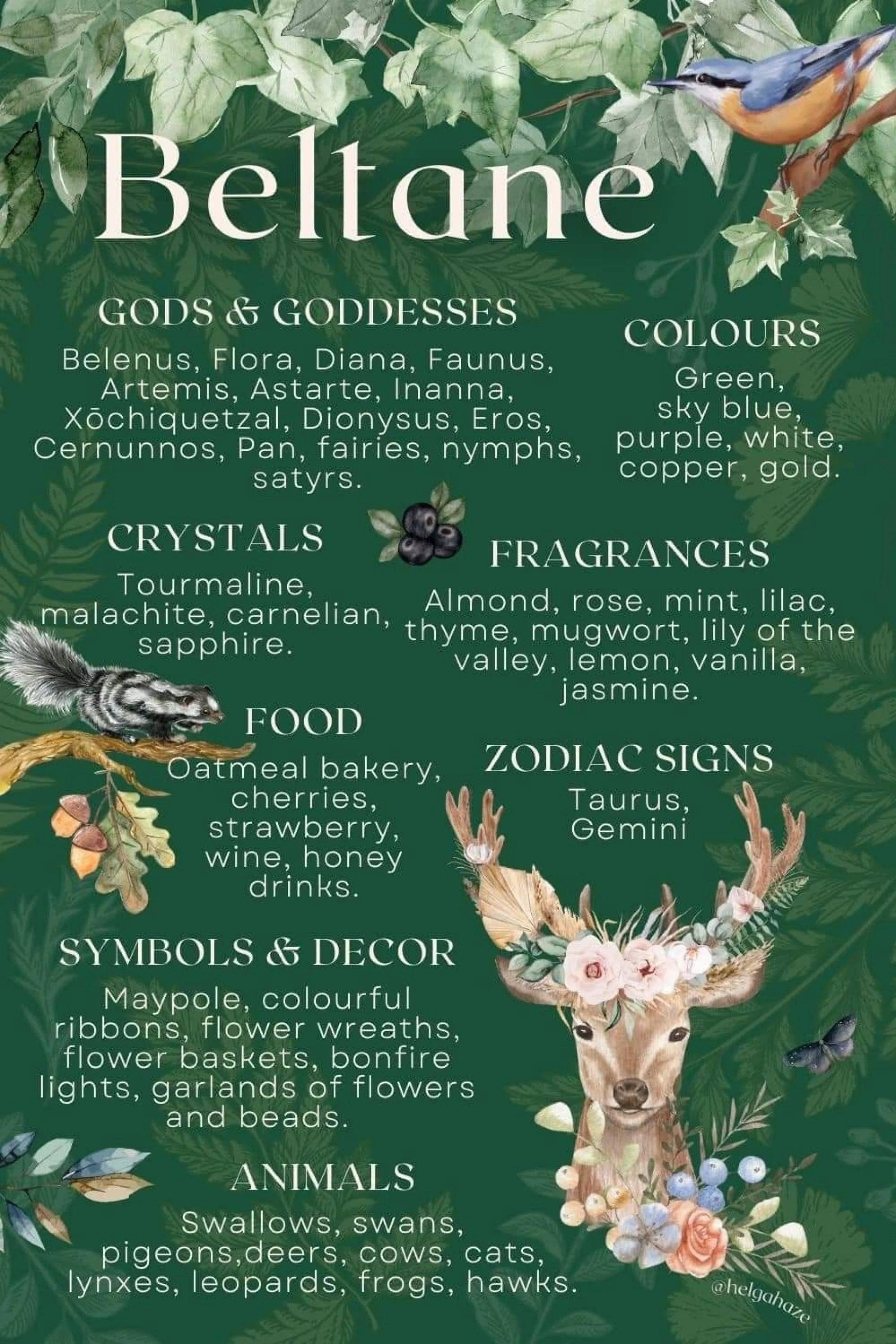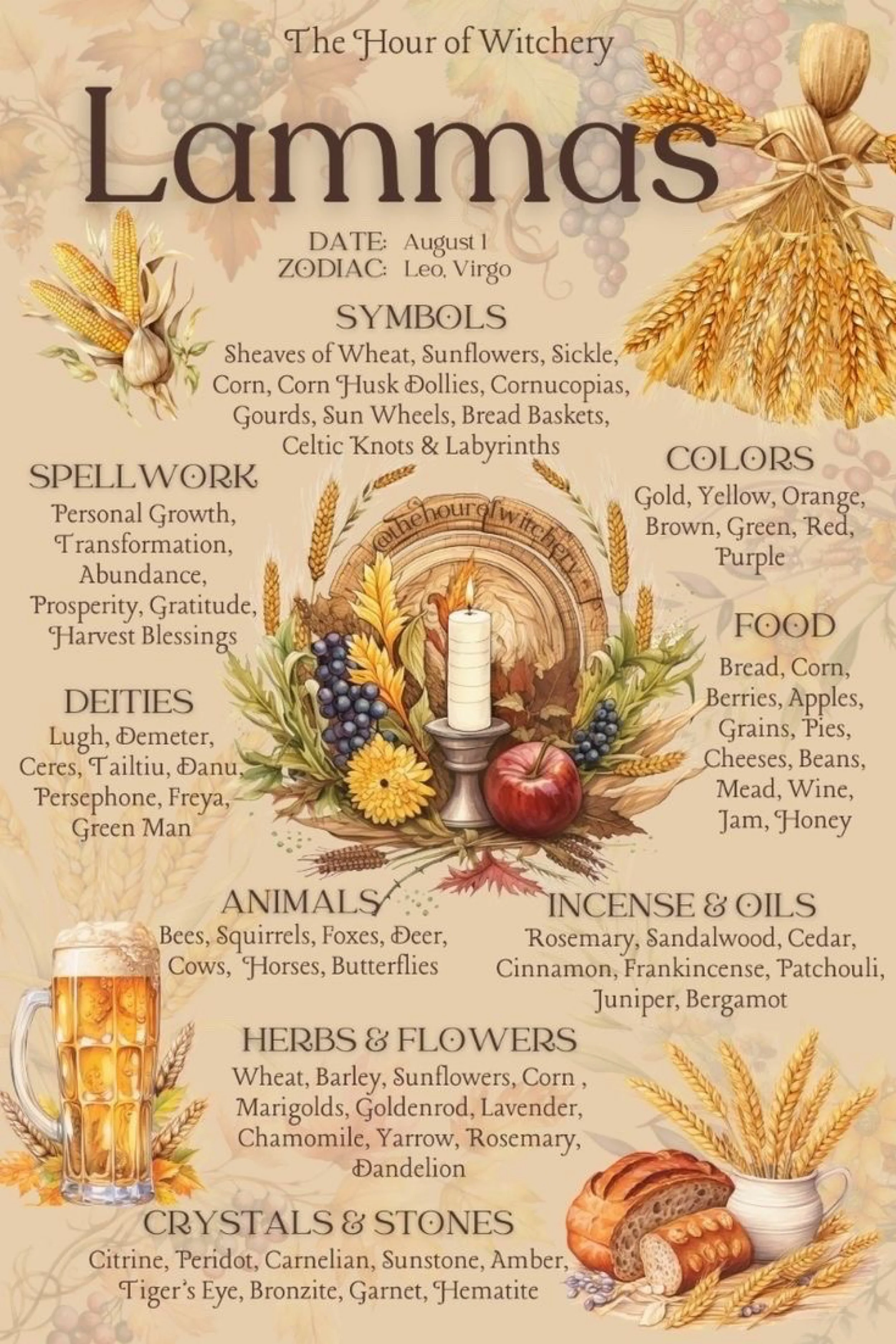Imbolc Magic: A Complete Guide to Welcoming the Light
As the wheel of the year turns, Imbolc arrives as a moment of quiet yet powerful transformation. Celebrated on February 1–2, this sabbat marks the midpoint between the winter solstice and the spring equinox. It is a time of purification, fertility, creative awakening, and the stirring of life beneath the surface of the still-cold earth. For centuries, Imbolc has been associated with the goddess Brigid, fire rituals, hearth magic, and the return of the sun. Today, modern practitioners use this sabbat to set intentions, refresh their spirits, and prepare for the growth ahead.
In this guide, we will explore Imbolc symbols, spellwork, foods, animals, deities, herbs, crystals, and everything you need to create a celebration of your own. I’ll also include plenty of Amazon product search links with my ID so you can gather the tools, foods, and ritual items you need to honor this sacred time.
The Symbols of Imbolc
Imbolc’s symbols are steeped in both fire and renewal. Traditional items include Brigid’s Cross, candles, corn dolls, snowflakes, brooms, sun wheels, seeds, and eggs. Each one represents purification, fertility, and the cycle of life.
- Brigid’s Cross for hanging above doors to bless and protect your home.
- Beeswax candles to light your altar with golden warmth.
- Decorative brooms as symbols of cleansing and new beginnings.
- Egg-shaped candles to represent fertility and rebirth.
Using these symbols in your space can help align your spirit with the energy of Imbolc, making your rituals and meditations even more powerful.
Spellwork for Imbolc
Imbolc is a time for purification, cleansing, and creative inspiration. Many choose to perform spells that focus on fertility, awakening, and connecting with nature.
- Purification rituals: Burn sage or palo santo to clear stagnant energy.
- Creative inspiration: Light a blue or white candle while journaling or painting to call on Brigid’s guidance.
- Fertility and abundance: Place crystal eggs on your altar as symbols of growth.
- Connection with nature: Meditate outdoors wrapped in a cozy wool blanket to tune into the earth’s rhythms.
These simple practices can help set intentions for the year ahead and ground you in the cycles of renewal.
Colors of the Season
Imbolc is visually tied to colors that symbolize purity, rebirth, and growth. White, yellow, green, pink, light blue, gold, and silver are all perfect for your altar or ritual wear.
- White altar cloths for purity.
- Gold ritual chalices for solar blessings.
- Green altar candles for fertility.
- Silver jewelry for lunar connections.
Wearing or decorating with these colors helps bring your practice into alignment with the sabbat’s sacred energy.
Deities of Imbolc
Imbolc is most strongly associated with Brigid, the Celtic goddess of poetry, healing, and smithcraft. Other deities honored during this time include Cailleach, Danu, Persephone, Demeter, Pan, and Freya.
To connect with these deities, consider adding items to your altar such as:
Invoking these divine presences can deepen your rituals and open pathways for wisdom and guidance.
Animals of Imbolc
Imbolc corresponds to burrowing animals like groundhogs, as well as lambs, sheep, swans, birds, fireflies, and bears. Each animal carries spiritual meaning:
- Lambs and sheep: Fertility, new life, innocence.
- Swans: Grace and transformation.
- Groundhogs: Awakening and foresight.
- Fireflies: Illumination and hope.
- Bears: Strength and endurance during winter.
Adding animal figurines or imagery to your altar can symbolize the presence of these sacred creatures.
Foods of Imbolc
Food plays a central role in Imbolc celebrations. Traditional foods include custards, puddings, cheeses, breads, cakes, honey, apples, pears, and herbal teas.
- Artisan cheeses for feasts.
- Honey jars for sweet offerings.
- Herbal tea assortments for warmth.
- Bread-baking kits to honor hearth traditions.
Cooking and sharing these foods with loved ones honors the nurturing spirit of Brigid and ties your celebration to ancient customs.
Herbs and Flowers
Herbs and flowers associated with Imbolc include snowdrops, primrose, crocus, daffodils, rosemary, violets, chamomile, and bay.
- Dried chamomile flowers for calming teas or incense.
- Fresh rosemary bundles for purification.
- Snowdrop bulbs to plant in your garden.
- Mixed spring flower seeds to celebrate fertility and renewal.
These herbs and flowers can be used in teas, incense, or ritual baths to align with Imbolc’s energies.
Incense and Oils
Scents are deeply tied to ritual and atmosphere. Imbolc calls for juniper, rosemary, jasmine, lavender, sandalwood, myrrh, bay, bergamot, mint, pine, and vanilla.
- Lavender essential oil for relaxation.
- Juniper incense sticks for purification.
- Sandalwood cones for grounding.
- Myrrh resin for sacred space.
Burn these during meditation or ritual to set the right mood for your celebration.
Crystals and Stones
Crystals bring powerful resonance to any sabbat. Imbolc’s crystals include amethyst, clear quartz, moonstone, garnet, rose quartz, peridot, amazonite, and jasper.
- Amethyst clusters for spiritual awakening.
- Moonstone pendants for intuition.
- Rose quartz hearts for love spells.
- Jasper palm stones for grounding energy.
Place them on your altar, carry them with you, or use them in spellwork to amplify intention.
Creating Your Imbolc Altar
An Imbolc altar is a sacred space to gather all these symbols, foods, herbs, and crystals. Begin with a white or gold cloth, place candles at the center, surround them with herbs, flowers, and stones, and add offerings of bread, milk, or honey.
Consider including:
- Altar cloth sets.
- Decorative chalices.
- Cauldrons for incense or offerings.
This space will become your focal point for meditation and spellwork during the sabbat.
Fire and Light Rituals
At its heart, Imbolc is about fire. Lighting candles or having a bonfire symbolizes the return of the sun and Brigid’s flame.
- Fire-safe cauldrons for safe rituals.
- Candle lanterns for ambiance.
- LED ritual candles for those in apartments or shared spaces.
Fire rituals can be as simple as lighting a single candle with intention or as elaborate as an outdoor bonfire circle.
Final Thoughts
Imbolc is not just a sabbat—it is a promise. A promise that the days will lengthen, warmth will return, and life will bloom again. Whether you honor it with a quiet tea ceremony, a firelit ritual, or a grand feast with friends, this time invites you to cleanse, refresh, and prepare for growth.
By surrounding yourself with the colors, herbs, foods, and sacred symbols of Imbolc, you align your spirit with the rebirth of the earth itself. With Brigid’s flame guiding you, may your year ahead be full of inspiration, abundance, and joy.




